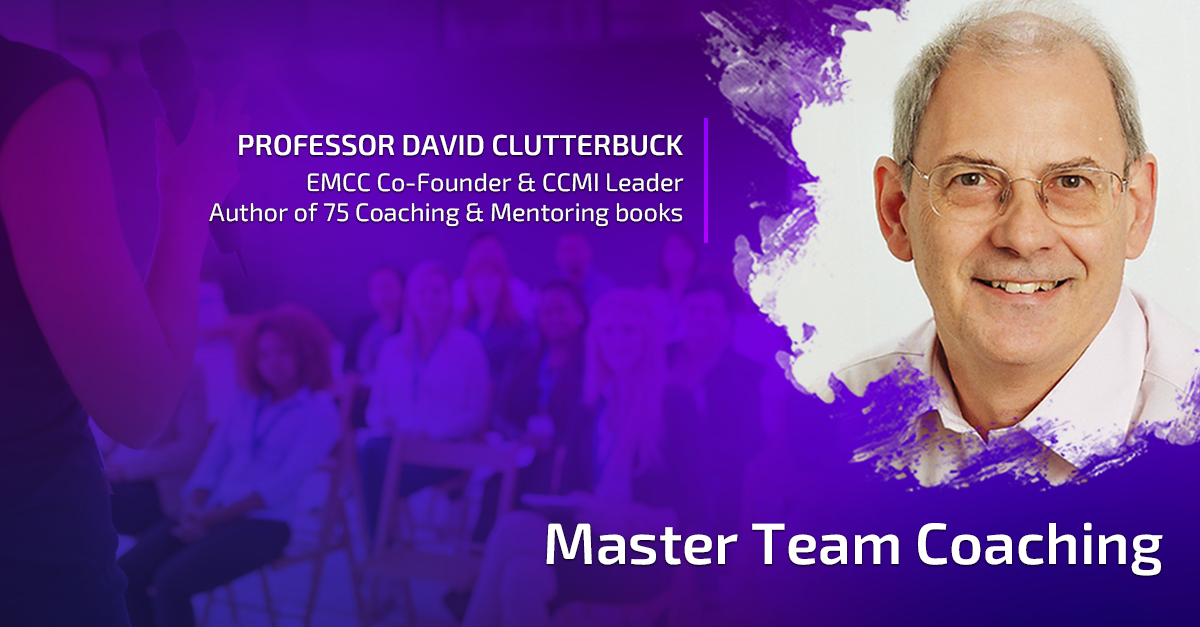Team Coaching by David Clutterbuck
EMCC Practitioner Level
02-03-04 April & 10-11-12 November 2022, Bucharest, Romania

Who is the course for?
- Business Leaders, Line Managers, Team leaders
- HR Leaders and Professionals who want to help deliver a programme to support team coaching
- Professional Coaches
Any of the following qualifies you for the course:
- Completion of Team Coaching Foundation level or equivalent.
- Practising 1-2-1 coach, mentor or leader with at least 18 months experience working with / developing / leading a team.
- This is a practitioner level course for people with experience of one-to-one coaching and teams already and not for absolute beginners.
Time commitment
Completed over 9-12 months, approx. 152 hours in total (36 hours: workshop, 40 hours: reading, 60 hours: reflection, skills practice with your teams and the 16 hours: assignment).
This is an immersive & experiential program requiring a full and active engagement.
Modules & Learning Outcomes:
Module 1: A deeper dive into complex adaptive systems
- a review of the PERILL model and the competencies of a team coach
- a practical framework for designing and implementing a successful team coaching assignment
- a role play that continues through the modules, covering every step of the team coaching process.
Learning outcomes:
- How to identify systems and patterns of team dynamics
- How to plan and schedule a team coaching assignment
- How to get started – the Discovery process
Module 2: Scoping the assignment and beginning the team coaching sessions
- the step-by-step review of the team coaching assignment.
- a range of tools and techniques for each element
- it continues the role play to provide an intensive and immersive experience of the reality of working with the team in the moment.
Learning outcomes:
- Key do’s and don’ts in scoping a team coaching opportunity
- How to distinguish between team coaching and other interventions, such as team building and team facilitation
- How to structure the Discovery phase
- How to use PERILL and other diagnostics in the Discovery phase
- How to apply linear, systemic and complex, adaptive systemic thinking to a team
- How to contract for good outcomes
Module 3: Process skills development
This module takes the team coaching assignment through the remaining stages of the team coaching process.
It emphasises the skills required to maintain a safe team learning space, helping the team understand its own systems and interpersonal dynamics. It addresses the complexity of working in a team coaching pair and provides a framework for containing the team coaching conversation.
It provides an extensive tool kit, along with multiple opportunities to practise. It concludes with a role play for making a pitch for a team coaching assignment.
Learning outcomes:
- How to deepen trust and psychological safety
- How to work with team narratives
- How to establish team norms
- How to build strong relationships within the team and with internal and external stakeholders
- How to evaluate the outcomes of team coaching
- How to design and deliver a strong pitch for team coaching.
Assessment & Assignments
- End of program assignment is an online form with a series of reflective questions – 2,500 words in total.
- You’ll need experience of working with two teams or more and around 4 sessions with each team in order to complete the assignment (we will provide some guidance to help find teams).
Accreditation process
Candidates who successfully complete the program and assignment will receive a certificate of accreditation from CCMI which you can use to claim 152 hours of CPD.
EMCC Awards:
- Upon graduation, Noosfera & CCMI will automatically recommend you to the EMCC for the Team Coaching Practitioner ITCA (Individual Team Coach award)
- As an EQA Training Provider, we will also recommend you for a European Individual Accreditation EIA (an individual Coach / Mentor level award at Practitioner level).
- One year EMCC Romania membership fee included (€150).
ICF Awards:
Whilst the ICF has published its Team Coaching Competencies and conducted a pilot programme (early 2022) it has not yet accredited any training programs. Until this has been established, all graduates will receive a certificate with 36.5 Core Competency (CC) and 3.5 Resource Development (RD) units to support your ICF submission.
